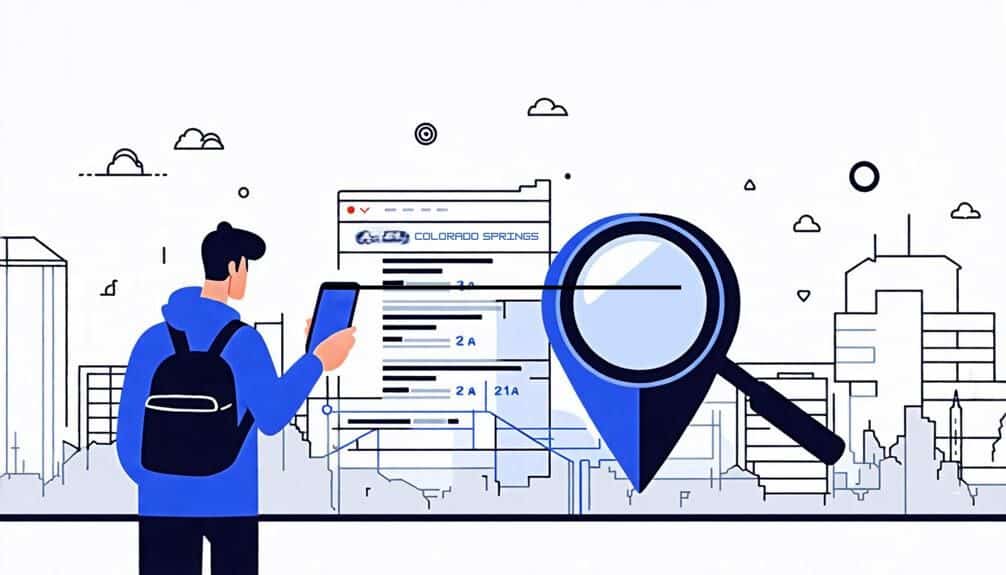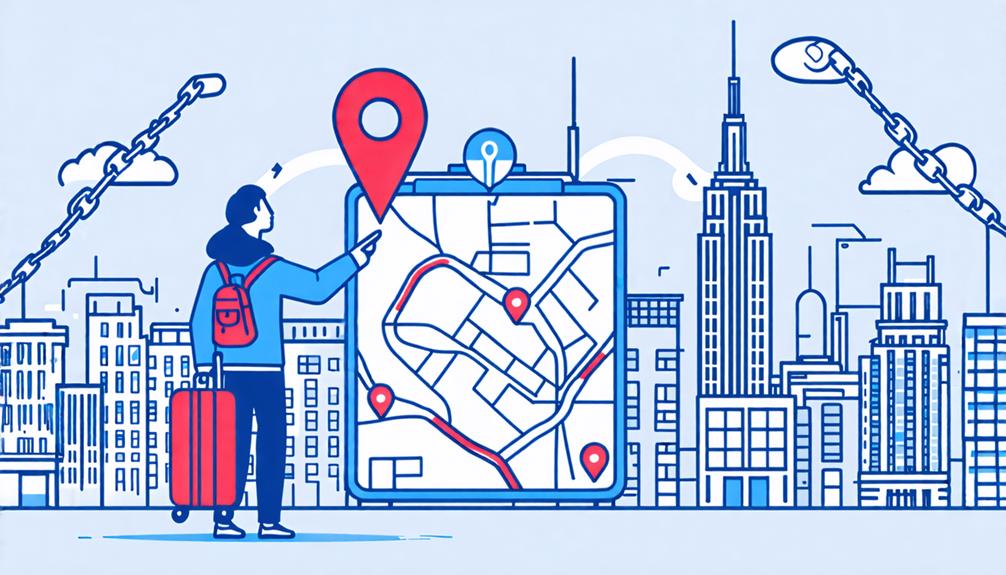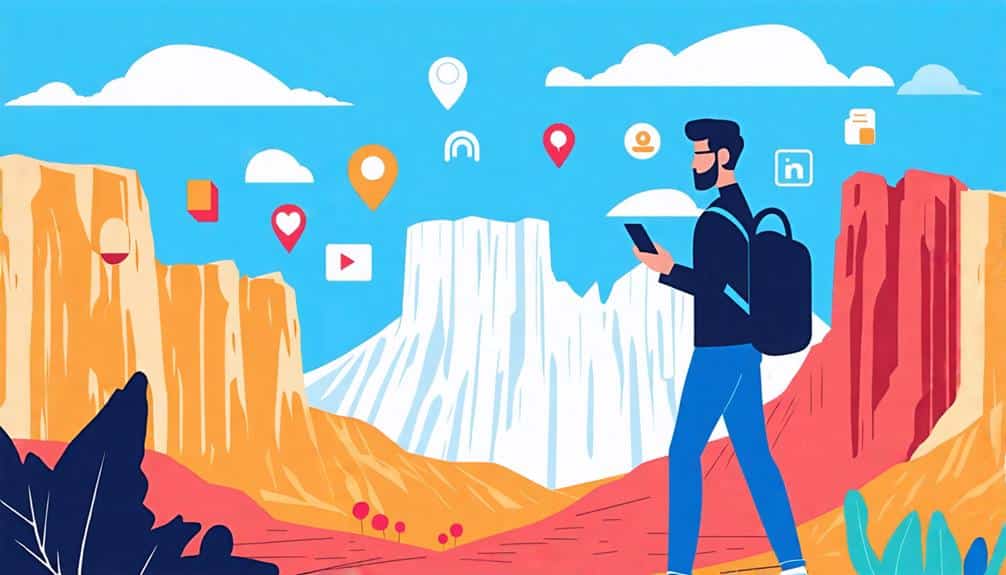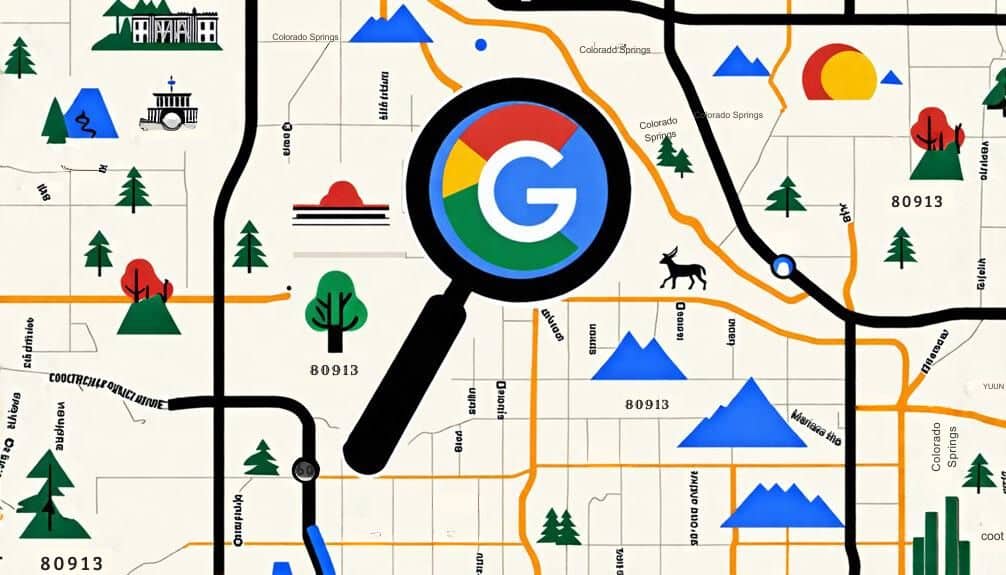Want to attract more tourists to your 80913-based business? Boost your local SEO game! Start by optimizing your Google My Business listing with eye-catching photos and up-to-date info. Target location-specific keywords like "Pikes Peak hiking tours" to draw in adventure seekers. Create content that showcases the area's charm, from hidden gems to must-visit attractions. Encourage happy customers to leave glowing reviews, and build partnerships with local businesses for valuable backlinks. Don't forget to make your website mobile-friendly for on-the-go travelers. With these tips, you'll be well on your way to becoming a tourist hotspot. But there's so much more to discover about mastering local SEO!
Optimize Google My Business Listing

In today's digital environment, optimizing your Google My Business (GMB) listing is essential for attracting tourists to your local business. It's your virtual storefront, and you want it to shine!
Start by claiming and verifying your listing if you haven't already. Trust us, it's a game-changer.
Next, fill out every section of your GMB profile. Don't skimp on the details! Add mouth-watering photos of your products or services, and keep your business hours up-to-date. Nothing's worse than a disappointed tourist who shows up when you're closed.
Here's a pro tip: encourage happy customers to leave reviews. Positive feedback is like gold for your business, and it'll make tourists more likely to choose you over the competition.
And don't forget to respond to those reviews – it shows you care!
Lastly, use GMB posts to share updates, events, and special offers. It's like having a mini-billboard right on your listing.
Keep it fresh and exciting, and you'll have tourists flocking to your door in no time!
Target Location-Specific Keywords
When it comes to attracting tourists, targeting location-specific keywords is an essential strategy for your local SEO efforts. You'll want to focus on terms that combine your services with the unique aspects of Colorado Springs and the 80913 zip code. Think about what makes your area special and incorporate those elements into your keyword strategy.
Consider creating content around these location-specific keywords:
| Local Attraction | Related Keyword |
|---|---|
| Pikes Peak | "Pikes Peak hiking tours" |
| Garden of the Gods | "Garden of the Gods photography spots" |
| Cheyenne Mountain Zoo | "Cheyenne Mountain Zoo tickets" |
| U.S. Olympic Training Center | "Olympic Training Center tours" |
| Air Force Academy | "Air Force Academy visitor info" |
Create Local Content

You'll captivate tourists by creating content that showcases your area's unique charm.
Highlight local attractions that make your destination special, from hidden gems to popular landmarks.
Craft area-specific guides that give visitors insider tips on the best places to eat, stay, and play, making them feel like they've got a local friend showing them around.
Highlight Local Attractions
Your city's unique attractions are the heart of its tourism appeal. To boost your local SEO and draw in more visitors, it's essential to shine a spotlight on these gems.
Start by creating dedicated pages on your website for each major attraction. Don't just list them – bring them to life with vivid descriptions, stunning photos, and even short videos.
Think about what makes each spot special. Is it the breathtaking view from Pikes Peak? The quirky charm of Garden of the Gods? Whatever it is, highlight those unique features.
Remember, you're not just sharing information; you're telling a story that'll make tourists enthusiastic to visit.
Don't forget to include practical details like operating hours, admission fees, and directions. And here's a fun tip: create a virtual tour or 360-degree view of the attraction. It's like giving visitors a sneak peek that'll leave them wanting more!
Lastly, keep your content fresh. Update it regularly with upcoming events, seasonal activities, or new exhibits. This not only helps with SEO but also gives tourists a reason to keep coming back to your site – and your city!
Craft Area-Specific Guides
While showcasing individual attractions is important, creating thorough area-specific guides can take your local SEO efforts to the next level. These extensive resources not only help tourists plan their trips but also boost your website's visibility in search results.
Start by crafting guides that cover different aspects of your area. You might create a "48 Hours in 80913" itinerary or a "Top 10 Hidden Gems" list.
Don't forget to include practical information like transportation options, local dining spots, and seasonal events. The key is to provide value that goes beyond what tourists can find on generic travel sites.
Make sure your guides are mobile-friendly and easy to navigate. Use headings, bullet points, and images to break up the text and keep readers engaged.
It's also a great idea to include local keywords naturally throughout your content.
Encourage Customer Reviews
Boasting positive reviews, local businesses can greatly boost their visibility and appeal to tourists. You'll want to encourage your satisfied customers to share their experiences online. Make it easy for them by providing direct links to your Google My Business, Yelp, or TripAdvisor profiles. Don't be shy about asking for reviews – most happy customers are glad to help!
Here's a quick guide to getting more reviews:
| Do | Don't |
|---|---|
| Ask politely after service | Offer incentives for reviews |
| Provide clear instructions | Pressure customers |
| Respond to all reviews | Ignore negative feedback |
| Share positive reviews on social | Write fake reviews |
| Train staff to request reviews | Delete unfavorable comments |
Build Local Backlinks

Building local backlinks is a powerful way to boost your visibility to tourists searching for your area. You can start by reaching out to tourism boards and offering to contribute content or collaborate on promotional efforts.
Don't forget to partner with other local businesses too – cross-promoting each other's services can lead to valuable backlinks and increased exposure to potential visitors.
Collaborate With Tourism Boards
Numerous tourism boards and local organizations can be valuable allies in your quest to boost local SEO for your tourist-focused business.
Don't shy away from reaching out to these groups – they're often enthusiastic to promote local attractions and businesses. Start by identifying relevant tourism boards, chambers of commerce, and visitor centers in your area.
They're goldmines of opportunity!
Once you've made contact, propose collaboration ideas that benefit both parties. You could offer to write guest blog posts for their websites, sharing your expertise about local attractions or insider tips.
In return, they might feature your business in their visitor guides or on their social media channels. It's a win-win situation!
Don't forget to ask for backlinks to your website from these authoritative local sources.
They'll give your SEO a serious boost and help you climb those search engine rankings. Plus, you'll be tapping into their established audience of potential visitors.
Partner With Local Businesses
While tourism boards are excellent partners, don't overlook the potential of teaming up with other local businesses. It's time to build those local backlinks!
Reach out to nearby hotels, restaurants, and attractions to create a network of mutual support. You'll be amazed at how a little collaboration can boost your SEO game.
Start by offering to feature these businesses on your website. In return, ask them to link back to you. It's a win-win situation!
You could create a "local recommendations" page, showcasing the best spots in 80913. This not only helps visitors plan their trip but also strengthens your local SEO.
Don't forget about cross-promotions! Team up with a local cafe to offer a discount to your customers, or partner with a tour company to create a special package.
These partnerships not only improve your online presence but also enhance the overall tourist experience.
Optimize for Mobile Devices
Mobile optimization is essential for attracting tourists to your local business. In today's digital age, most travelers rely on their smartphones to find nearby attractions, restaurants, and services. If your website isn't mobile-friendly, you're missing out on a huge opportunity to connect with potential customers.
First, verify your website loads quickly on mobile devices. Slow-loading pages are a major turn-off for impatient tourists who want information fast. Compress images, minimize code, and use a responsive design that adapts to different screen sizes.
Next, focus on local keywords and phrases that tourists might use when searching for businesses like yours. Include your city name and neighborhood in your content, meta descriptions, and headers.
Don't forget to optimize your Google My Business listing with accurate information and eye-catching photos.
Make it easy for visitors to contact you with prominent click-to-call buttons and map integration.
And here's a fun tip: create a mobile-friendly virtual tour of your business. It's like inviting tourists in for a sneak peek before they even arrive!
Leverage Social Media Platforms

Social media platforms offer a goldmine of opportunities for attracting tourists to your local business. You'll want to make the most of these powerful tools to boost your visibility and draw in visitors to your area.
Start by creating engaging profiles on popular platforms like Facebook, Instagram, and Twitter. Share stunning photos of local attractions, mouth-watering dishes from nearby restaurants, and exciting events happening in your community.
Don't forget to use relevant hashtags to increase your reach. For example, #Visit80913 or #Explore80913 can help tourists find your content easily. Engage with your followers by responding to comments and messages promptly.
You can even run contests or giveaways to encourage user-generated content, which adds authenticity to your marketing efforts. Consider partnering with local influencers or travel bloggers to showcase your area's unique offerings. Their followers might just become your next guests!
And hey, why not throw in a dash of humor with funny local memes or witty captions? It'll make your content more relatable and shareable. Remember, social media is all about being social, so have fun with it!
Utilize Schema Markup
Schema markup is a powerful tool that can greatly boost your local SEO efforts and attract more tourists to your business. It's like giving search engines a roadmap to understand your website's content better.
By implementing schema markup, you're fundamentally speaking the language that search engines love, making it easier for them to showcase your business to potential tourists.
You'll want to focus on local business schema, which helps highlight vital information like your address, phone number, and operating hours.
Don't forget to include schema for events, attractions, and special offers too! This way, when tourists are searching for things to do in 80913, your business will stand out in the search results.
It might sound technical, but don't worry – there are plenty of user-friendly tools to help you implement schema markup.
Once you've got it set up, you'll be amazed at how much more visible your business becomes in local searches.
Plus, with rich snippets appearing in search results, you'll catch the eye of tourists browsing for their next adventure.
Monitor Local Search Rankings

After implementing schema markup, you'll want to keep a close eye on your local search rankings. It's essential to monitor how well your business appears in search results for tourists looking for attractions in 80913. You can use various tools to track your rankings and see how you stack up against competitors.
Here's a handy table to help you understand what to monitor:
| Metric | Why It Matters | How to Track |
|---|---|---|
| Organic Rankings | Shows overall visibility | SEO tools |
| Local Pack Position | Indicates local relevance | Google Search Console |
| Review Ratings | Impacts click-through rates | Review monitoring tools |
| Click-Through Rate | Measures listing effectiveness | Google Search Console |
| Conversion Rate | Tracks tourist bookings | Website analytics |
Don't forget to check your rankings regularly – at least once a week. You'll be amazed at how quickly things can change! If you notice any sudden drops, it's time to investigate and make adjustments. Remember, staying on top of your rankings isn't just about vanity – it's about making sure tourists can find you easily. So roll up your sleeves and get tracking!
Frequently Asked Questions
How Do I Handle Seasonal Fluctuations in Tourist Traffic for My Business?
You've got to roll with the seasons! Embrace the ebb and flow of tourist traffic by planning ahead.
During peak times, ramp up your staff and inventory. When it's slow, get creative! Offer special off-season deals, host unique events, or partner with local businesses for package deals.
Don't forget to update your online presence regularly. Keep your website fresh and engage on social media year-round.
What Are Effective Ways to Collaborate With Local Tourism Boards?
Collaborating with local tourism boards can be a game-changer for your business!
Start by reaching out and introducing yourself. Offer to host familiarization tours or provide special deals for board members. You'll want to contribute content for their website and social media channels, showcasing your unique offerings.
Don't forget to participate in their events and workshops – it's a great way to network and stay informed.
How Can I Tailor My SEO Strategy for International Tourists?
To tailor your SEO strategy for international tourists, you'll want to focus on multilingual content. Create versions of your website in popular languages, and use hreflang tags to help search engines understand which language to show.
Don't forget to research keywords in those languages too! Highlight universal attractions and experiences that appeal across cultures.
Partner with international travel bloggers and influencers to boost your visibility.
What Role Do Local Events Play in Boosting Tourism-Related Seo?
Local events are a goldmine for your tourism-related SEO! They're like magnets, drawing in visitors and creating buzz.
When you highlight these events on your website, you're not just informing tourists—you're boosting your search rankings too. Think of it as a win-win situation: you're helping travelers discover exciting local happenings while improving your online visibility.
Don't forget to use event-specific keywords and create engaging content around these activities. It's a surefire way to make your destination shine in search results!
How Often Should I Update My Local SEO Strategy for Tourism?
You should update your local SEO strategy for tourism regularly, at least every 3-4 months.
Stay on top of seasonal trends and upcoming events in your area to keep your content fresh and relevant.
Don't forget to refresh your Google My Business listing, update photos, and respond to reviews.
It's exciting to see your efforts pay off as more tourists discover your destination!
